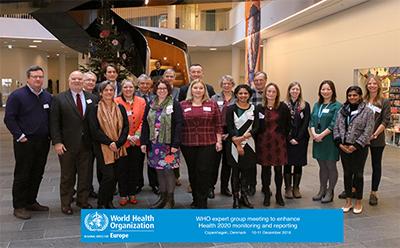
The development of international guidelines for health is a complex process influenced by a range of stakeholders including policy makers, implementing agencies, knowledge brokers and target populations. In 2018, I got the opportunity to work on a report for the Health Evidence Network (HEN)1 commissioned by the Division of Information, Evidence, Research and Innovation, World Health Organization - Regional Office for Europe (Copenhagen).
Introducing the life-course approach into health policy: the Southampton connection
A life-course approach to health looks back at life experiences of individuals and populations, or across generations, to understand patterns and variations of health and disease - recognising that both past and present experiences are shaped by the wider social, economic and cultural contexts. This approach now has become a cornerstone for policy making.
The MRC life course Epidemiology Unit, Southampton and Institute of Developmental Sciences, University of Southampton have led vital research in this area globally, demonstrating important and preventable causes of common chronic conditions. This work contributed to the acceptance of the approach in the Minsk Declaration (2015)2 which had enormous implications on health systems across Europe. The declaration stated that ‘the life-course approach is an essential step towards the implementation of Health 2020 and the goals and targets in the United Nations 2030 Agenda for Sustainable Development.’ Countries hereby committed to making greater use of the life-course approach in needs assessments, selection of priorities, monitoring, evaluation and reporting on health outcomes at the regional level.
To address the need to develop a measurement strategy which would allow the WHO Regional Office for Europe to monitor and report on how Member States were implementing a life-course approach within their health policies and programmes we were commissioned to produce a ‘HEN report’.
A novel process for developing actionable options and outcomes for policymakers
I worked on the HEN report3 under the guidance of Prof Mark Hanson (Institute of Developmental Sciences, Southampton General Hospital), Prof Cyrus Cooper and Prof Janis Baird (MRC-life course Epidemiology Unit, Southampton). The report aimed to support decision-makers in shaping national and regional policies for the implementation of a life-course approach by identifying relevant evidence on the measurement of policies and programmes based on such an approach.
A rapid review4 methodology was deemed appropriate to retrieve policies, implementation strategies, academic papers, and grey literature. Other methods included conducting targeted searches on websites of public health organisations of member states, repeating the search in Russian (as it is the working language for several WHO European member states), and consulting experts in the field to identify case studies.
Another challenge was making sense of the results to develop actionable options and outcomes for policymakers. What worked well in one country, may not be generalizable to all regions. We also wanted to produce a report that would engage policymakers and provide solutions to problems in applying it a real-life context. Hence we presented case studies and best practice examples to demonstrate how life-course can be incorporated into routine programmes, and how existing survey platforms and indicators that are routinely monitored in each country can be used to report on the implementation.
Working with the WHO
The HEN secretariat includes a diverse team with expertise in policy writing who helped us with the language and tone of the report. I also observed that organisations such as the WHO are keen on including qualitative research and would like to capture the cultural contexts of the concepts. The report went through thorough internal (WHO) and external peer review to ensure that only relevant and evidence-based options were put through.
Contact with the WHO team was mainly through video conferencing and emails. An expert group meeting was conducted in Copenhagen (Dec 2018) before publication of the report to discuss the final draft, and to discuss the other reports that were published based on value-based concepts. Prof Hanson and I presented the review at the meeting attended by a multidisciplinary audience including academics, policy experts (e.g. ex-ministers of health) and WHO representatives. Some fascinating and rich discussions followed on the content of the HEN report.
I was excited to see how widely our report could influence health systems across the globe to improve health across the life-course and help populations achieve a healthy start to life. Though the process was longer compared to publishing in academic research, it gave me an insight into the challenges of translating science to policy and the value of having diverse stakeholders for health-related decision-making.
Overall, the experience helped in increasing my understanding of evidence-informed policy making and how researchers can effectively contribute to decision-making. I would recommend such collaborations to all researchers and look forward to working on similar projects in the future.
The Health Evidence Network (HEN) is a unit within the WHO that gives access to independent and reliable health information and evidence for policy-makers in the European region to build health policy.
Dr Chandni Maria Jacob
MBBS, MSc PH
PhD candidate, Human Development and Health
Faculty of Medicine
University of Southampton
@chandni_mjacob
About the author: Dr Jacob has background in medicine and public health. Her work focuses on influencing policy and practice to prevent non-communicable diseases and improve health in the preconception period.
She is supported by the European Union's Horizon 2020-funded LifeCycle Project under grant agreement No. 733206 and by the National Institute for Health Research, United Kingdom, through the Southampton Biomedical Research Centre.
- HEN website: http://www.euro.who.int/en/data-and-evidence/evidence-informed-policy-making/health-evidence-network-hen
- Minsk declaration: http://www.euro.who.int/__data/assets/pdf_file/0009/289962/The-Minsk-Declaration-EN-rev1.pdf?ua=1
- Jacob CM, Cooper C, Baird J, Hanson M. What quantitative and qualitative methods have been developed to measure the implementation of a life-course approach in public health policies at the national level? Copenhagen: WHO Regional Office for Europe; 2019 Available at: http://www.euro.who.int/en/data-and-evidence/evidence-informed-policy-making/publications/2019/what-quantitative-and-qualitative-methods-have-been-developed-to-measure-the-implementation-of-a-life-course-approach-in-public-health-policies-at-the-national-level-2019
- HEN guidelines on methodology: A resource for developing an evidence synthesis report for policy-making (2017) http://www.euro.who.int/en/data-and-evidence/evidence-informed-policy-making/publications/2017/resource-for-developing-an-evidence-synthesis-report-for-policy-making-a-2017